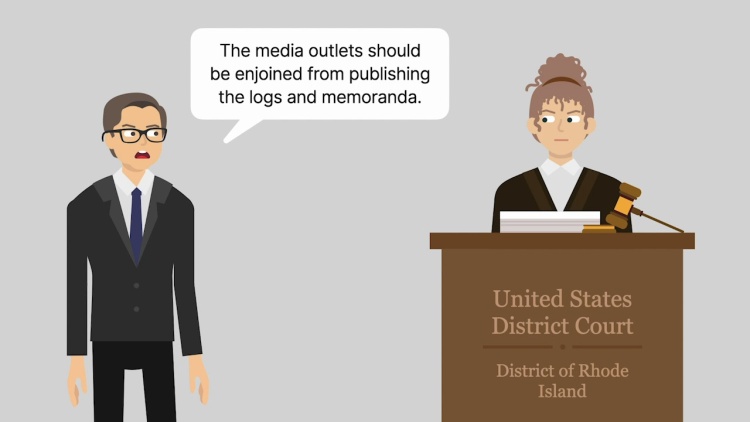In re Providence Journal Co.
United States Court of Appeals for the First Circuit
820 F.2d 1342, 820 F.2d 1354 (1987), cert. dismissed, 485 U.S. 693
- Written by Rose VanHofwegen, JD
Facts
In the 1960s, the Federal Bureau of Investigation (FBI) tape-recorded prominent organized-crime figure Raymond L. S. Patriarca without a warrant. The FBI later destroyed the recordings but kept compiled logs and memoranda. After Patriarca’s death, the FBI gave the logs and memos to media outlets in response to Freedom of Information Act requests. Patriarca’s son Raymond J. Patriarca (plaintiff) sued the FBI and media outlets (defendants) to enjoin publication of the information. The next day, the court entered a temporary restraining order (TRO) blocking publication and set a hearing for three days later. Meanwhile, Providence Journal Company (the journal) published an article on Patriarca using the information to meet its publication deadline about eight hours later. The court ultimately vacated the TRO but found the journal guilty of criminal contempt for violating it while in effect, sentenced executive editor Charles Hauser to jailtime suspended on Hauser performing public service, and fined the journal $100,000. The journal and Hauser appealed. After a First Circuit panel issued its decision, the court granted a petition to rehear the matter en banc.
Rule of Law
Issue
Holding and Reasoning (Wisdom, J.)
What to do next…
Here's why 904,000 law students have relied on our case briefs:
- Written by law professors and practitioners, not other law students. 47,100 briefs, keyed to 995 casebooks. Top-notch customer support.
- The right amount of information, includes the facts, issues, rule of law, holding and reasoning, and any concurrences and dissents.
- Access in your classes, works on your mobile and tablet. Massive library of related video lessons and high quality multiple-choice questions.
- Easy to use, uniform format for every case brief. Written in plain English, not in legalese. Our briefs summarize and simplify; they don’t just repeat the court’s language.





